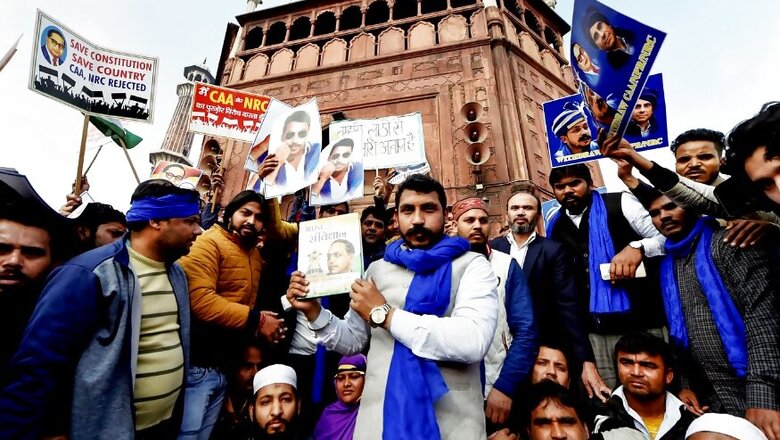
views
Bhim Army chief Chandrashekhar Azad formed a new political organisation, Azad Samaj Party (ASP), on the birth anniversary of Bahujan Samaj Party (BSP) founder Kanshi Ram. There were two purposes behind the move, Azad said. Firstly, creating political conditions for the complete implementation of the Indian constitution prepared by BR Ambedkar.
Secondly, the organisation would work to build leaders and form a society and community that understand the value of their votes and don’t sell "people's trust capital" in the electoral market for the lust of power. He didn't clearly state whether or not the Azad Samaj Party intends to contest elections, but hinted that the organisation will engage in active politics. The Dalit leader said that the Bhim Army and Azad Samaj Party will work parallelly.
In this political strategy, which he has derived from the same model that Kanshi Ram developed during the initial phase of the Bahujan movement in Uttar Pradesh in which The All India Backward And Minority Communities Employees Federation (BAMSEF) and BSP worked parallelly but supported each other to strengthen Bahujan politics. Similarly, Azad set up the Bhim Army as a forum for social movement and developing a network of sympathisers who may support and generate political resources, issues and conditions for the ASP.
The step to form the party on the birthday of Kanshi Ram is also a strategic move by Azad to claim the political legacy of the late leader and replace the BSP in Bahujan politics. Former UP chief minister Mayawati anticipates this possibility and that is why, just after the formation of the ASP, she said that the party had nothing to do Ambedkar or Kanshi Ram, and was just playing into the hands of forces who opposing the BSP.
Azad is working one step at a time to enter electoral politics. At first, he worked for social causes such as spreading education among Dalits, fighting against oppression of Dalits by dominant castes, restoration of self-respect among Dalit communities, creating Dalit-Muslim unity by showing his active involvement in the protest movements against the Citizenship Amendment Act (CAA).
Through these involvements, he tried to develop contacts, networks and political ground for pursuing electoral politics in northern India, especially Uttar Pradesh. Most leaders emerging from social movements either join a political party or establish one of their own. For instance, Jignesh Mewani in Gujarat who joined the Congress and Arvind Kejriwal in Delhi who formed his own party are two such leaders. Azad seems to be seeking a major intervention in politics and that is why he didn't go down the path taken by Mewani, another young Dalit leader.
If Azad enters electoral politics with the ASP, he will influence the politics of western UP, Delhi, Haryana and some areas of Punjab more than any other part of northern India. Due to his active involvement in the protests against the Delhi Development Authority (DDA) demolishing the Ravidas temple in the capital last year, he has expanded his political base and popularity among the Ravidassia Dalits of Punjab.
And because of his committed participation in the anti-CAA demonstrations, he has succeeded in building trust in the Muslim community that is influential in the politics of western Uttar Pradesh, Delhi and several parts of India. He is working hard to build a Dalit-Muslim alliance which may be extended to various parts of the country if he travel and mobilises people for electoral politics at a pan-India level.
If Azad and the ASP enter the next assembly elections in Uttar Pradesh, he may make a dent in the BSP support base and add a section of Muslims and other communities around it. But the young leader may face some problems in this endeavour, especially in Uttar Pradesh. He does not yet have sufficient political presence in central UP, Bundelkhand and eastern UP. He will have to toil to build up his base in the regions except western UP. His other challenge is to develop a language which is more influential and powerful than the BSP's political language.
Azad's entry in politics has multiple implications. In one sense, it will be the beginning of the erosion of the BSP’s political base. Initially, the ASP may just be a 'vote-cutter' at several places. But if Azad tries relentlessly, he may displace Mayawati's BSP gradually. Also, his political foray may appear beneficial for the BJP, but slowly he could emerge as a challenge for the mainstream electoral politics led by the saffron party in northern India, particularly in UP.
If he grows stronger, it will diminish hopes of the Congress to regain its Dalit base in the Hindi belt. All these possibilities depend on Azad's appetite for the grind to establish his brand of politics in northern India. Whether or not he will be a game changer in Indian politics hinges on that.
(The author is professor and director of GB Pant Social Science Institute, Prayagraj. Views are personal)




















Comments
0 comment